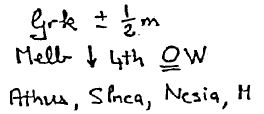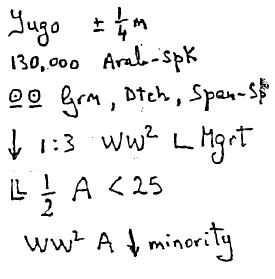Notetaking
Some symbols & abbreviations used by interpreters.
On this page I tēnei whārangi
Symbols with predicative functions
In consecutive interpreting, the arrow is one of the most useful symbols in note-taking. It has a wide range of functions and meanings.

|
arrive; come to; introduce; import; transmit; tend towards;· lead to |

|
receive; depart; come from; proceed from |

|
return from; to |

|
improve; increase; add; develop; speed-up |

|
worsen; decrease; decline; slow down |
Another versatile symbol is a slanting line indicating relationships:

|
related to; connected with; in respect of; concerning |
| to be (vb); equal; comprise | |
| not to be; not equal to; be different from | |
| do away with; forbid; cannot; must not* *X is often used to indicate the No. of times so the the curved X is better in this case |
|
| state; say; declare; announce | |
| think | |
| to decide | |
| approve; agree; acceptable | |

|
disapprove; disagree ; unacceptable |
Symbols indicating time

|
now; at present; today |

|
past; formerly |
| long ago | |

|
future; afterwards; coming |

|
in the distant future |
| soon | |
| very soon; shortly | |
| period of time | |
| beginning of a period of time or action | |
| end of a period of time or action |
General symbols and abbreviations
| country; state | |
| region | |
| city | |
| world | |
| nation; people; group of people | |
| question; problem | |
| perhaps | |
| very likely | |
| therefore; consequently | |
| conference; meeting; congress | |
| surprise; unusual | |
| bring closer; bring together; put into contact | |
| move apart; separate | |
| always | |

|
never |
| remember; recall | |
| suggest; propose; suggestion; proposal | |
| to change; alter | |
| all |
Symbols for emphasis
![]() when drawn below a symbol or abbreviation a line indicates a bigger size or quantity. The more lines, the greater the emphasis
when drawn below a symbol or abbreviation a line indicates a bigger size or quantity. The more lines, the greater the emphasis
Examples
![]() city
city
![]() a big city
a big city
![]() a very big city
a very big city
![]() the biggest city in the world
the biggest city in the world
![]() when drawn above a symbol or an abbreviation, a line indicates a smaller size or quantity:
when drawn above a symbol or an abbreviation, a line indicates a smaller size or quantity:
Examples
![]() a small city
a small city
![]() a very minor matter
a very minor matter
Point
| point | |
| point of argument of discussion | |

|
point of view |
Note taking excercises
In the last 25 years, particularly, 3.1 million people came from 70 different countries and locations around the world. That was an intake of migrants 5 times that of the United Natio... United States, rather, in the same period. Today, in Australia, there would be 13% of the Australian population that would have some blood connection with Italy. There would be a million people in Australia of Italian birth or extraction. And, of course, that dates bock to the arrival of the first Italian settler, a guest of the government, Mr Tuso (?), on the First F1eet in 1788.

Then in terms of Greek settlement, there would be about a half a million people of Greek birth or descent in Australia. And Melbourne today is the fourth largest Greek-speaking city in the world. It follows Athens, Salonica and Nicosia, the Cypriot/the Cypriot capital as the fourth largest Greek-speaking city in the world.

And then, of course, you have from Malta 400,000 people either born there or their parents came from there, and that means that we have in Australia 50,000 people, more people of Maltese birth or descent than there are in Malta, because the entire Republic or Malta, I think has 350,000. We have 50,000 more.

Now in terms of Yugoslav settlers, there would be more than a quarter of a million and that comes from all over the component states and independent republics of Yugoslavia. And then 130,000 people that... whose first language would be Arabic. And then, large groups, such as people of German origin... Dutch... Spanish speaking and/and so on. So that you got today one Australian in three a product of post-war migration, and also half the population will shortly be under 25, and so those people who were alive in Australia at the time of World War I1 are now in a minority.

The Geneva Notation System
Based on the following principles:
- Bringing across the idea, not the word
- Abbreviating
- Linking
- Negation (denying)
- Stress
- Verticality
- Shifting
Abbreviating
spec:
- special, spl
- speciality, spty
- specialised, sped
prod:
- production, pron
- producer, prer
- product, prct
- productivity, prty
com:
- commission, com
- committee, ctee
I speak (say): I"
I will speak later: I"ll
Which contributed to: helped
With reference to the situation at this point in time:
- as sit on now
Linking
as, car, why: general concept of explanation
tho: general concept of opposition
(But), sed, ma: general concept of restriction
if: general concept of presumption
as to: general concept of reference
asi: general concept of conclusion
= general concept of correspondence, equality
≠ general concept of difference
de+ general concept of supplementary information
Negation
Approve: OK
Disapprove: NoOK or ![]()
Stress/emphasis
The study is interesting: intg
The study is very interesting:![]()
The study is extremely interesting:![]()
The important question is... ![]()
We must examine with great care: care
A solution which is not so decisive:![]()
Verticality
The report with regard to Western Europe: 
The report with regard to Western Europe is an interesting document:![]()
Since the delegations of France, the United Kingdom and the United States have proposed As 
Which led to new investments especially in the area of transport
Shifting
In the course of the year 1954, prices underwent an increase,
Without, however, reaching the level of increase of incomes, so that the national income in fact grew.

In 1954 prices went up,
But not as much as income,
So that the national income increased

